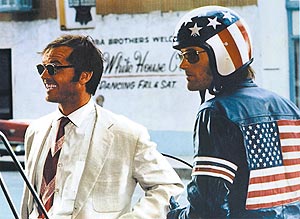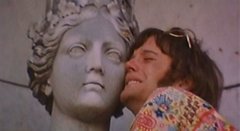1969 was a watershed year for both America and the movies. While the war in Viet Nam dragged on and turmoil raged at home, movie audiences watched as two generations of Fondas appeared in movies about the American dream. In Sergio Leone’s Once Upon A Time In The West, Henry Fonda played Frank, a gunslinger so ruthless that he shoots a child during his first scene. In They Shoot Horses, Don’t They?, daughter Jane Fonda played a woman struggling to survive the Great Depression. And, in Easy Rider, Peter Fonda played Captain America.
 The Captain America of Easy Rider should not be mistaken for the super soldier played by Chris Evans. Instead, this Captain America is actually Wyatt Williams, a motorcycle rider who is planning on going to Mardi Gras with his friend Billy (Dennis Hopper, who also directed). Wyatt is nicknamed Captain America because he wears a leather jacket with an American flag on the back. It is an appropriate nickname because Wyatt represents everything that is good about America.
The Captain America of Easy Rider should not be mistaken for the super soldier played by Chris Evans. Instead, this Captain America is actually Wyatt Williams, a motorcycle rider who is planning on going to Mardi Gras with his friend Billy (Dennis Hopper, who also directed). Wyatt is nicknamed Captain America because he wears a leather jacket with an American flag on the back. It is an appropriate nickname because Wyatt represents everything that is good about America.
When we first meet Captain America, he and Billy are engaged in a business transaction, bringing to mind the old saying that the business of America is business. They are selling cocaine to none other than Phil Spector. Taking Spector’s money, Wyatt stuffs it into a plastic tube that he keeps hidden in his motorcycle’s fuel tank. It is no coincidence that the fuel tank is decorated with the stars and bars.
 Having made their money, Wyatt and Billy ride across the country to celebrate. At the start of their journey, Wyatt takes off his watch and leaves it on the ground, declaring that time has no meaning to a man who has freedom. If you replaced their motorcycles with horses, there would be little to distinguish Wyatt and Billy from the American outlaws who might show up in an old Henry Fonda western.
Having made their money, Wyatt and Billy ride across the country to celebrate. At the start of their journey, Wyatt takes off his watch and leaves it on the ground, declaring that time has no meaning to a man who has freedom. If you replaced their motorcycles with horses, there would be little to distinguish Wyatt and Billy from the American outlaws who might show up in an old Henry Fonda western.
On their way to New Orleans, Wyatt and Billy interact with many different people. If the always paranoid and nervous Billy represents America’s worst impulses, Wyatt represents the best. When Wyatt and Billy eat dinner with a rancher and his family, Wyatt alone appreciates what the rancher has accomplished and says, “You’ve got a nice place. It’s not every man that can live off the land, you know. You do your own thing in your own time. You should be proud.” When they later stop off at a ramshackle hippie commune, Wyatt is the one who says, in the best tradition of American optimism, that “They’ll make it.”
 When they stop to pick up a hitchhiker and then later when alcoholic lawyer George Hanson (Jack Nicholson) joins them on their trip, it’s always Wyatt who volunteers to share his bike. (Billy always rides alone.) Whenever they stop for the night, it is always the generous Wyatt who offers to share his grass with whomever is traveling with them. When George smokes for the first time, Wyatt is the one who teaches him. It is the stoned George who tells Wyatt and Billy that they represent freedom.
When they stop to pick up a hitchhiker and then later when alcoholic lawyer George Hanson (Jack Nicholson) joins them on their trip, it’s always Wyatt who volunteers to share his bike. (Billy always rides alone.) Whenever they stop for the night, it is always the generous Wyatt who offers to share his grass with whomever is traveling with them. When George smokes for the first time, Wyatt is the one who teaches him. It is the stoned George who tells Wyatt and Billy that they represent freedom.
It is only after George is beaten to death by a group of rednecks that Wyatt loses his optimistic outlook and his generous spirit. George’s death opens Wyatt’s eyes in much the same way that the turmoil of the 1960s did for the rest of America. After George’s murder, Wyatt loses his faith in himself. When he and Billy reach New Orleans, Mardi Gras is a letdown. When he takes the acid that was given to him by the hitchhiker, Captain America’s journey becomes a bad trip both figuratively and literally.
 While Billy insists that they had a great time in New Orleans (in much the same way that some insist that America is just as strong a nation as it has ever been), Wyatt knows the truth. “We blew it,” Wyatt says, speaking for the entire nation.
While Billy insists that they had a great time in New Orleans (in much the same way that some insist that America is just as strong a nation as it has ever been), Wyatt knows the truth. “We blew it,” Wyatt says, speaking for the entire nation.
Despite his mistakes and despite having blown it, Wyatt, much like America itself, remains good at heart. When Captain America dies at the end of the film, it is because he is trying to protect his friend Billy. In the best American tradition, he sacrifices himself to protect another.
This Independence Day, let us all take a few moment to appreciate Wyatt Williams, the man known as Captain America.

Wyatt Williams (aka Captain America) RIP
 Darlene Love in the studio with Phil Spector, 1963
Darlene Love in the studio with Phil Spector, 1963 



